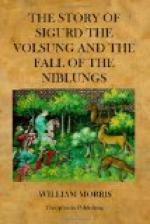Then spake the elder of days:
“Hearken now, Sigurd, and hear;
Time was when I gave thy father
a gift thou shalt yet deem dear,
And this horse is a gift of
my giving:—heed nought where thou mayst
ride:
For I have seen thy fathers
in a shining house abide,
And on earth they thought
of its threshold, and the gifts I had to
give;
Nor prayed for a little longer,
and a little longer to live.”
Then forth he strode to the
mountains, and fain was Sigurd now
To ask him many a matter:
but dim did his bright shape grow,
As a man from the litten doorway
fades into the dusk of night;
And the sun in the high-noon
shone, and the world was exceeding bright.
So Sigurd turned to the river
and stood by the wave-wet strand,
And the grey horse swims to
his feet and lightly leaps aland,
And the youngling looks upon
him, and deems none beside him good.
And indeed, as tells the story,
he was come of Sleipnir’s blood,
The tireless horse of Odin:
cloud-grey he was of hue,
And it seemed as Sigurd backed
him that Sigmund’s son he knew,
So glad he went beneath him.
Then the youngling’s song arose
As he brushed through the
noon-tide blossoms of Gripir’s mighty close,
Then he singeth the song of
Greyfell, the horse that Odin gave,
Who swam through the sweeping
river, and back through the toppling
wave.
Regin telleth Sigurd of
his kindred, and of the Gold that was
accursed from ancient days.
Now yet the days pass over,
and more than words may tell
Grows Sigurd strong and lovely,
and all children love him well.
But oft he looks on the mountains
and many a time is fain
To know of what lies beyond
them, and learn of the wide world’s gain.
And he saith: “I
dwell in a land that is ruled by none of my blood;
And my mother’s sons
are waxing, and fair kings shall they be and good;
And their servant or their
betrayer—not one of these will I be.
Yet needs must I wait for
a little till Odin calls for me.”
Now again it happed on a day
that he sat in Regin’s hall
And hearkened many tidings
of what had chanced to fall,
And of kings that sought their
kingdoms o’er many a waste and wild,
And at last saith the crafty
master:
“Thou
art King Sigmund’s child:
Wilt thou wait till these
kings of the carles shall die in a little
land,
Or wilt thou serve their sons
and carry the cup to their hand;
Or abide in vain for the day
that never shall come about,
When their banners shall dance
in the wind and shake to the war-gods’
shout?”




